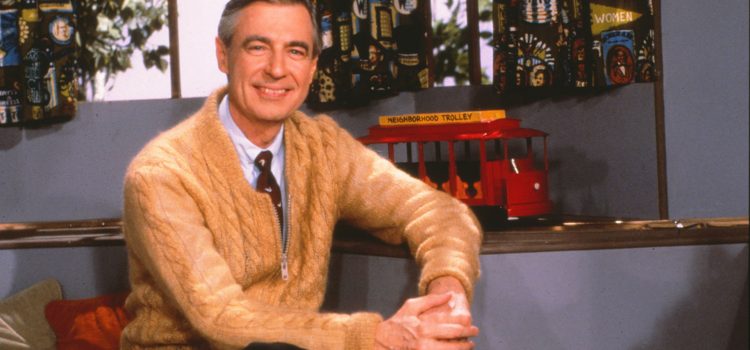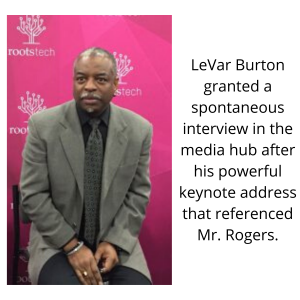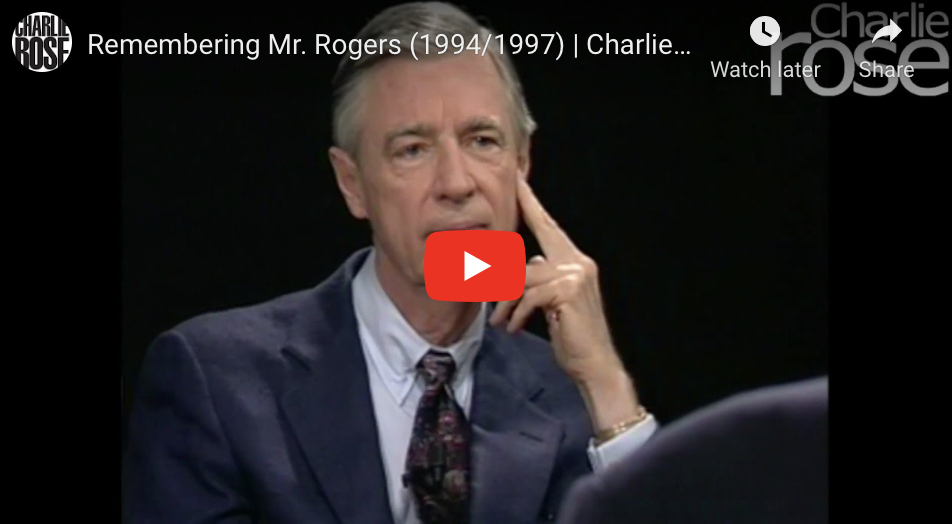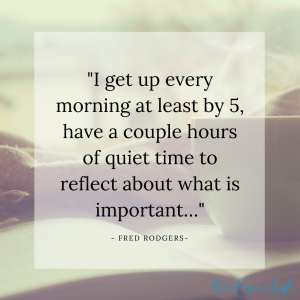
A plaque beside Mr. Fred Rogers’ office chair read: “What is essential is invisible to the eye.” Mr. Rogers and Charlie Rose talk about what is essential in a 1997 interview by Charlie Rose. The YouTube video of it recently caught my attention. I watched because at RootsTech 2017, LeVar Burton drew upon an experience he had with Mr. Rogers, and it created a palpable shift in the room’s energy, prickling the hair on my arms and making my eyes well with emotion.
It felt like the sort of moment that can alter the course of human events. Even Burton seemed overwhelmed by what happened. Prior to that moment, he had been reserved with the media, perhaps a natural result of so many appearances at Star Trek conventions. Afterward, however, he granted unscheduled interviews and opened up in a way that one inside source told us was uncharacteristic. As in, he does not let his guard down in public.
Mr. Rogers creates a moment for LeVar Burton

The experience that precipitated it was as follows. Years earlier Burton attended a White House event where Mr. Fred Rogers spoke to a high-powered guest list. Mr. Rogers asked everyone to close their eyes and think of the person who believed in them the most. Now, Burton gave that same directive to RootsTech attendees. A few thousand humans simultaneously conjured love and gratitude for someone who made the difference for them.
When we all did, I am telling you it felt like some “freaky, old–timey, voodoo-style Big Magic” to steal a quote from author Elizabeth Gilbert. Others might call it the Spirit and some people may define it more simply as the most powerful force of all, love. Regardless of the name, the feeling in that room had a profound effect on me. Since that day, I express more gratitude for those who have made the difference in my life. Also, I call upon forces beyond myself in my work. Since making this shift, I’ve had some uncanny experiences in my work where I have felt help from forces beyond myself. (That’s a whole ‘nuther story, but I wrote about it here.)
A Powerful Interview with Mr. Rogers
With that backdrop, I felt like watching the Rose/Rogers interview was witnessing a spiritual master at work, a superhero whose power is humility. Mr. Rogers’ lack of ego is so profound, it makes everyone else grow bigger.
Furthermore, although Charlie Rose is conducting the interview, Mr. Rogers reverses the roles and begins asking Rose poignant questions, “What is essential about you, Charlie?” Rose begins to answer and then laughs, “See what he’s doing? He is turning this around, isn’t he?” However, even after acknowledging it, though, Rose candidly shares his desire to make a difference. Always the validator, Mr. Rogers agrees, “Have you ever known anybody who was really satisfied or happy who has never made a difference in somebody else’s life?”

In that exchange, I realized I was watching a master class on interviewing. In the future, I am totally using this video as a training tool when I hire interviewers. Here is Charlie, the professional who is well paid to put guests at ease and draw out the best from them, and to be fair, he does a nice job. However, he is still charmed by a genuine compliment that Mr. Rogers gives, “I talked to someone the other day who said, ‘I am addicted to Charlie Rose…I said, ‘I know him and he is one of the easiest people to talk with.'” After that Rose asked, “Did you say that?” Mr. Rogers replied, “I did say that.”
The Value of Quiet
Mr. Rogers volleys important questions to Rose throughout like, “Do you get enough quiet?” When Rose admits he tries but often goes too fast, Mr. Rogers reassures him, “Well, you are an enthusiastic man. That’s why people like to be around you…”
You can tell by watching this lovely conversation that these are not gimmicks Mr. Rogers used to win friends and influence people. Rather, it feels like without his own ego in the way, Mr. Rogers creates space for others to feel their own worth. Even when the spotlight shined on him in a TV interview, he conveys a quiet peace. He was the same man in all circumstances.
When pressed, Mr. Rogers did open up about how he kept himself grounded, “I get up every morning at least by 5, have a couple hours of quiet time to reflect about what is important…before I go swimming and then the business of the day.”
What Can We Do?
Then he asks Charlie a most remarkable question:
“What can we do–those of us who are purveyors of this television medium–to encourage people to have more quiet in their lives? More silence? Real revelation comes through silence.”
It seems a daunting task that is increasingly important, yet Mr. Rogers’ Neighborhood did exactly that. As competing programs garnered boisterous attention, Mr. Rogers remained a calming friend to children everywhere.
When asked how many children he thought he had influenced he said, “I don’t care how many, even if it’s just one. We get so wrapped up in numbers in our society. The most important thing is that we are able to be one-to-one, you and I with each other at the moment. If we can be present to the moment with the person that we happen to be with, that’s what’s important.”
Rogers continues with the thought, “I know that when I walk out of the studio someday and there is a child who has Downs Syndrome, for instance, and that child comes up and gives me a hug, I know that that’s the field I want to be growing in. Because I see that people who are not the fancy people of this world are the ones who seem to nourish my soul. And I want to learn how to be the best receiver that I can ever be. Because I think graceful receiving is one of the most wonderful gifts we can give anybody.”
Learning from Kids
When asked what he learned from kids, Mr. Rogers said, “Practically everything. How to know that it’s all right to say what comes to your mind right away.” He continues the thought, “Jesus said to the people around him, ‘Please, let the little children come up here. I want to learn from them.’ He may not have said those words, but I think that’s what he meant. I want to be involved with these innocent people who make up the kingdom of heaven.”
Anger, Suicide and Loneliness
When I started watching the video, I supposed I anticipated this kind of wisdom, but I did not see it coming when Mr. Rogers turned to some of life’s most troubling subjects: anger and suicide. He referenced a suicide by someone who seemed to have it all. Rose and Rogers wondered, “What was it that we didn’t know about our friend?” Mr. Rogers responds, “There are times that people just can’t share what is essential within them…We didn’t know what it was that was making her lonely.” He speculates that someday when we are in heaven we will learn.
[Watch related video: a conversation with Rob A. Gentile, whose near-death experience (Quarks of Light) is resonating for people who have been affected by suicide. It has been a #1 bestseller in the category “psychology of suicide.”]
When I watched this interview with Mr. Rogers, I couldn’t help but wonder, what if everyone had a one-to-one relationship with a Mr. Rogers type of person? What if each of us could bring more validation to our friends? More quiet into our own lives? What if we all felt more space to say what immediately comes to our mind and to share what is essential within us? Or share what is making us lonely?
There are, of course, no easy answers to suicide, and too many “what if” questions after. Last winter a beautiful young mother I knew took her life, and I processed that heartbreak in an article entitled, “If we make it through December.” I can only imagine how her grieving children must have needed a friend like Mr. Rogers to process such enormous feelings. Perhaps that is why it seemed timely to add Mr. Rogers’ voice to the conversation on suicide now.
Related article: What is your purpose?
How Mr. Rogers Manages Anger
In the interview, Mr. Rogers shared thoughts on anger too, and what he does when he feels angry, if one can imagine Mr. Rogers in that state. He read a letter by a boy and his advice to create a healthy outlet by playing the piano very loud and swimming fast. (I think I will try this!)
Understanding that children need to process difficult emotions, he aired a special show on PBS on the evening after John Lennon was shot. “There are people in the world that are so sick or so angry that they sometimes hurt other people…”
In the Rose interview, Mr. Rogers issues a challenge to all of us that still stands: “One of the things that our whole world needs to be able to work on more, are ways to deal with anger.”
Related article: Writing about the hard stuff
You can watch the full interview on YouTube.

Rhonda Lauritzen is the founder and an author at Evalogue.Life – Tell Your Story. Rhonda lives to hear and write about people’s lives. She believes that when you tell your story, it changes the ending., She and her husband Milan restored an 1890 Victorian in Ogden. She especially enjoys unplugging in nature. Check out her books: How to Storyboard, and Every Essential Element. Most recently she was the writing coach of bestselling author, Rob A. Gentile, who wrote Quarks of Light, A Near-Death Experience: What I Saw That Opened My Heart




Really informative article. thanks!
Agreed, Julie! Thanks for your terrific support!
I love this article! I’m am loving what you do and what you are sharing. Thank you!
Thank you so much for the kind words, Julie. It means a lot to us!